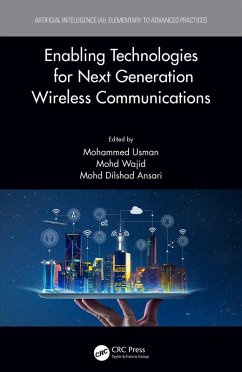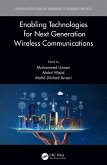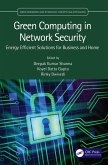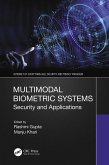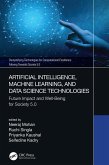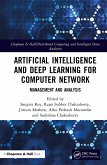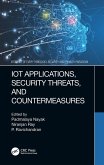Enabling Technologies for Next Generation Wireless Communications (eBook, PDF)
Redaktion: Usman, Mohammed; Ansari, Mohd Dilshad; Wajid, Mohd
55,95 €
55,95 €
inkl. MwSt.
Sofort per Download lieferbar

28 °P sammeln
55,95 €
Als Download kaufen

55,95 €
inkl. MwSt.
Sofort per Download lieferbar

28 °P sammeln
Jetzt verschenken
Alle Infos zum eBook verschenken
55,95 €
inkl. MwSt.
Sofort per Download lieferbar
Alle Infos zum eBook verschenken

28 °P sammeln
Enabling Technologies for Next Generation Wireless Communications (eBook, PDF)
Redaktion: Usman, Mohammed; Ansari, Mohd Dilshad; Wajid, Mohd
- Format: PDF
- Merkliste
- Auf die Merkliste
- Bewerten Bewerten
- Teilen
- Produkt teilen
- Produkterinnerung
- Produkterinnerung

Bitte loggen Sie sich zunächst in Ihr Kundenkonto ein oder registrieren Sie sich bei
bücher.de, um das eBook-Abo tolino select nutzen zu können.
Hier können Sie sich einloggen
Hier können Sie sich einloggen
Sie sind bereits eingeloggt. Klicken Sie auf 2. tolino select Abo, um fortzufahren.

Bitte loggen Sie sich zunächst in Ihr Kundenkonto ein oder registrieren Sie sich bei bücher.de, um das eBook-Abo tolino select nutzen zu können.
This book will provide up-to-date information on emerging trends in wireless systems, their enabling technologies and their evolving application paradigms to researchers, technologies, developers, engineers, policy decision-makers, as well as graduate students.
- Geräte: PC
- ohne Kopierschutz
- eBook Hilfe
- Größe: 6.5MB
Andere Kunden interessierten sich auch für
![Enabling Technologies for Next Generation Wireless Communications (eBook, ePUB) Enabling Technologies for Next Generation Wireless Communications (eBook, ePUB)]() Enabling Technologies for Next Generation Wireless Communications (eBook, ePUB)55,95 €
Enabling Technologies for Next Generation Wireless Communications (eBook, ePUB)55,95 €![Green Computing in Network Security (eBook, PDF) Green Computing in Network Security (eBook, PDF)]() Green Computing in Network Security (eBook, PDF)48,95 €
Green Computing in Network Security (eBook, PDF)48,95 €![Multimodal Biometric Systems (eBook, PDF) Multimodal Biometric Systems (eBook, PDF)]() Multimodal Biometric Systems (eBook, PDF)48,95 €
Multimodal Biometric Systems (eBook, PDF)48,95 €![Artificial Intelligence, Machine Learning, and Data Science Technologies (eBook, PDF) Artificial Intelligence, Machine Learning, and Data Science Technologies (eBook, PDF)]() Artificial Intelligence, Machine Learning, and Data Science Technologies (eBook, PDF)51,95 €
Artificial Intelligence, Machine Learning, and Data Science Technologies (eBook, PDF)51,95 €![Artificial Intelligence and Deep Learning for Computer Network (eBook, PDF) Artificial Intelligence and Deep Learning for Computer Network (eBook, PDF)]() Artificial Intelligence and Deep Learning for Computer Network (eBook, PDF)47,95 €
Artificial Intelligence and Deep Learning for Computer Network (eBook, PDF)47,95 €![Applications of Blockchain Technology (eBook, PDF) Applications of Blockchain Technology (eBook, PDF)]() Anita RavaniApplications of Blockchain Technology (eBook, PDF)52,95 €
Anita RavaniApplications of Blockchain Technology (eBook, PDF)52,95 €![IoT Applications, Security Threats, and Countermeasures (eBook, PDF) IoT Applications, Security Threats, and Countermeasures (eBook, PDF)]() IoT Applications, Security Threats, and Countermeasures (eBook, PDF)60,95 €
IoT Applications, Security Threats, and Countermeasures (eBook, PDF)60,95 €-
-
-
This book will provide up-to-date information on emerging trends in wireless systems, their enabling technologies and their evolving application paradigms to researchers, technologies, developers, engineers, policy decision-makers, as well as graduate students.
Dieser Download kann aus rechtlichen Gründen nur mit Rechnungsadresse in A, B, BG, CY, CZ, D, DK, EW, E, FIN, F, GR, HR, H, IRL, I, LT, L, LR, M, NL, PL, P, R, S, SLO, SK ausgeliefert werden.
Produktdetails
- Produktdetails
- Verlag: Taylor & Francis eBooks
- Seitenzahl: 295
- Erscheinungstermin: 28. Dezember 2020
- Englisch
- ISBN-13: 9781000328943
- Artikelnr.: 60770853
- Verlag: Taylor & Francis eBooks
- Seitenzahl: 295
- Erscheinungstermin: 28. Dezember 2020
- Englisch
- ISBN-13: 9781000328943
- Artikelnr.: 60770853
- Herstellerkennzeichnung Die Herstellerinformationen sind derzeit nicht verfügbar.
Dr. Usman received B.E in Electronics and Communications from Madras University, India in 2002. He received his M.Sc and PhD from University of Strathclyde, UK in 2003 and 2008 respectively. He is the recipient of the University scholarship from Strathclyde for his PhD. He has more than a decade of experience in academics and academic administration. He is a senior member of IEEE and IEEE Communications Society. He has been TPC chair and organizing chair for IEEE conferences and actively involved in IEEE activities. He is currently working as Assistant Professor in the department of Electrical Engineering at King Khalid University, Saudi Arabia. He received the 'academic excellence' award from the College of Engineering at King Khalid University and also received the award for best project in 2016. A senior design project under his supervision received the 'talent and innovation' award in 2018. His research is focused on technologies for next generation wireless networks, signal processing for biomedical application, probabilistic modeling and channel coding. Dr. Mohd Dilshad Ansari is currently working as Assistant Professor in the Department of Computer Science & Engineering at CMR College of Engineering & Technology, Hyderabad, India. He received B.Tech in Information Technology from Uttar Pradesh Technical University, Lucknow, UP in 2009. He received his M.Tech and Ph.D. in Computer Science & Engineering from Jaypee University of Information Technology, Waknaghat, Solan, HP, India in 2011 and 2018 respectively. He has more than 7 years of Academic Experience as well as published more than 30 papers in International Journals (SCIE/Scopus) and conferences (IEEE/Springer). He is the Member of various Technical/Professional societies such as IEEE, UACEE and IACSIT. He has been appointed as Editorial/Reviewer Board and Technical Programme Committee member in various reputed Journals/Conferences. He is also Guest Editor of Special Issues from Reputed Journals and Organized Special Sessions in IEEE/Springer Conferences. His research interest includes Digital & Fuzzy Image Processing, Machine Learning, IoT, and Cloud Computing. Dr. Mohd Wajid is currently working as Assistant Professor in Electronic & Communication Dept., Aligarh Muslim University, Aligarh, India. He did his B.Tech (Electronics) from AMU - Aligarh and M.Tech (VLSI and Embedded Systems) from IIIT Hyderabad. He obtained PhD degree in Signal Processing from Indian Institute of Technology Delhi, India. His doctoral work was on Design and Analysis of Microphone based Acoustic Vector Sensor for 2D Direction of Arrival Estimation. Before joining Aligarh Muslim University, he was associated with Jaypee University of Information Technology - Solan, Texas Instruments - Bangalore, Xilinx India Technology Services Private Limited - Hyderabad, and also he served as a Senior Engineer in the "Professional Electronics and Industrial System Division" of Blue Star Limited - New Delhi.
1. Next Generation Wireless Systems - Introduction, Requirements,
Challenges and Applications. 2. Signal Processing for Next Generation
Wireless Systems. 3. Channel Coding for Future Wireless Communication. 4.
Multi-Carrier and Multi-Antenna Systems - Massive MIMO. 5. Spectrum
Management and Planning. 6. MM Wave Communication. 7. Visible Light
Communication (VLC). 8. Channel Modeling. 9. Artificial Intelligence and
Machine Learning for Wireless Communication. 10. Cloud Computing Paradigms.
11. Security. 12. Network Architecture and Protocols. 13. Internet of
Things (IoT). 14. Vehicular Networks. 15. Case Studies on Application
Scenarios.
Challenges and Applications. 2. Signal Processing for Next Generation
Wireless Systems. 3. Channel Coding for Future Wireless Communication. 4.
Multi-Carrier and Multi-Antenna Systems - Massive MIMO. 5. Spectrum
Management and Planning. 6. MM Wave Communication. 7. Visible Light
Communication (VLC). 8. Channel Modeling. 9. Artificial Intelligence and
Machine Learning for Wireless Communication. 10. Cloud Computing Paradigms.
11. Security. 12. Network Architecture and Protocols. 13. Internet of
Things (IoT). 14. Vehicular Networks. 15. Case Studies on Application
Scenarios.
1. Next Generation Wireless Systems - Introduction, Requirements,
Challenges and Applications. 2. Signal Processing for Next Generation
Wireless Systems. 3. Channel Coding for Future Wireless Communication. 4.
Multi-Carrier and Multi-Antenna Systems - Massive MIMO. 5. Spectrum
Management and Planning. 6. MM Wave Communication. 7. Visible Light
Communication (VLC). 8. Channel Modeling. 9. Artificial Intelligence and
Machine Learning for Wireless Communication. 10. Cloud Computing Paradigms.
11. Security. 12. Network Architecture and Protocols. 13. Internet of
Things (IoT). 14. Vehicular Networks. 15. Case Studies on Application
Scenarios.
Challenges and Applications. 2. Signal Processing for Next Generation
Wireless Systems. 3. Channel Coding for Future Wireless Communication. 4.
Multi-Carrier and Multi-Antenna Systems - Massive MIMO. 5. Spectrum
Management and Planning. 6. MM Wave Communication. 7. Visible Light
Communication (VLC). 8. Channel Modeling. 9. Artificial Intelligence and
Machine Learning for Wireless Communication. 10. Cloud Computing Paradigms.
11. Security. 12. Network Architecture and Protocols. 13. Internet of
Things (IoT). 14. Vehicular Networks. 15. Case Studies on Application
Scenarios.
